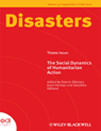
The paper seeks to link contemporary thinking on urban shelter in the humanitarian sector to debates in the field of ‘critical urban theory’. It argues that current humanitarian thinking on urban shelter shares many common concerns with critical urban theory, but that these concerns are rarely translated effectively into humanitarian practice. It attributes this disconnect not only to weaknesses in implementation capacity, but also to the need to reorient humanitarian action to address more definitively questions of power and justice. Humanitarian actors need to step back from product-delivery approaches and find ways of integrating into their analytical, planning, implementation and monitoring tools questions about access, exclusion and the historically specific ways in which these aspects converge in particular urban spaces. By doing so, the humanitarian community would benefit from a more explicit, systematic and sustained engagement with the catalytic theoretical resources that critical urban theory has to offer.
Links
Resource collections
- UN Habitat - Urban Response Collection
- Urban Response - Urban Crisis Preparedness and Risk Reduction
- Urban Response Collection - Community Engagement and Social Cohesion
- Urban Response Collection - Economic Recovery
- Urban Response Collection - Environment and Climate Change
- Urban Response Collection - Housing, Land and Property
- Urban Response Collection - Urban Crisis Response, Recovery and Reconstruction
- Urban Response Collection - Urban Resilience